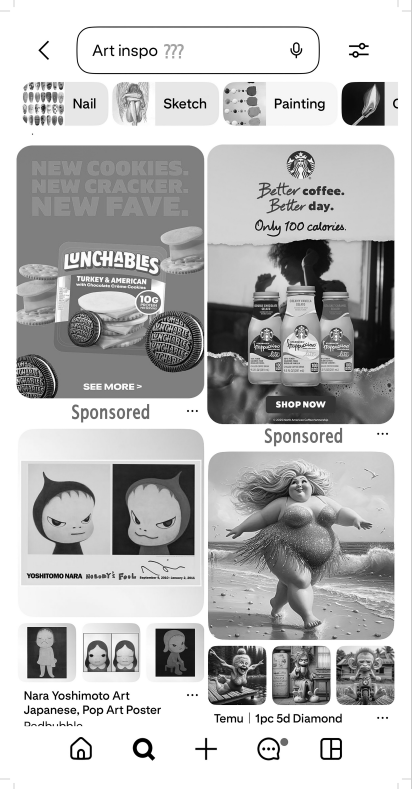These days, everywhere you go, it feels like someone is trying to sell you something. Social media, which has become the de facto third space of this generation, is no exception. Some of the most popular websites have begun to feel unusable with the constant barrage of advertisements.
The justification is simple in that websites can continue to be used by everyone for free while advertisers can shove their products in your face, but the increasing overabundance of these ads has been an obvious trend over the years.
Pinterest is an app that algorithmically recommends images, almost infinitely, based on the user’s search habits. Typically, it is used to sort ideas into boards to use for inspiration for things like cooking, art and interior design. The layout of Pinterest’s home page makes it easy for sponsored posts and ads to blend in with normal posts, even if they have nothing to do with the user’s usual recommended content.
The difference between Pinterest’s home page with and without an adblocker enabled is almost night and day. For instance, even if you’re always being recommended cooking content, you will still see ads from companies like Ford and Liberty Mutual. The formatting of these ads are designed to look exactly like any other post on Pinterest, but will still clog up the feed and stick out in an obnoxious way. Targeted advertising based on user data is a whole other conversation, but regardless, having your feed constantly interrupted hinders the intended experience.
If you’re wondering why the internet is now only usable under three layers of adblock and a VPN, you can thank the concept of “enshittification,” a term coined by Canadian blogger Cory Doctorow in his article, “Too big to care.” Doctorow details how companies are able to increase their profits despite making their platforms worse for users simply because its too big to fail and there are no alternatives.
Social media giants solidified themselves as monopolies, generating seemingly infinite profit from shareholders and advertisers while facing no competition. There is no longer any need for individual forums when Reddit exists, or a need for personal blogs when Substack exists, for example. Because of this, these websites can, more or less, keep making user unfriendly decisions with no repercussions.
Pinterest’s personalized ads section of its help center page admits that it can see the gimmick of its platform as the perfect catalyst for advertisers, “People come to Pinterest in search of inspiration, crafted goods and a community of like-minded creatives, making it an ideal place for you to showcase the ideas and products that define your business.”
This sort of practice has turned Pinterest, and other platforms that revolve around image sharing, into glorified Etsy offshoots. Pinterest’s support of small businesses is a poorly disguised way to open the floodgate for every multibillion dollar corporation to plaster itsads all over the home page. It’s actually quite difficult to find ads that aren’t from already well-established companies, so if you are a small business selling hand-made goods and looking to grow, you will likely be drowned out by Home Depot anyway.
Using adblockers is more important than ever, now that the entire internet is made up of corporations trying to sell you things. More people need to take their internet experience back into their own hands, especially since the “enshittification” process will only get worse.







